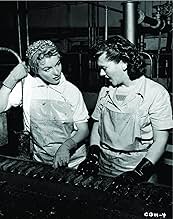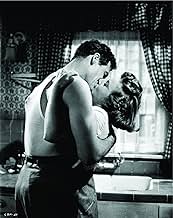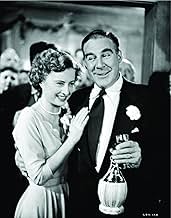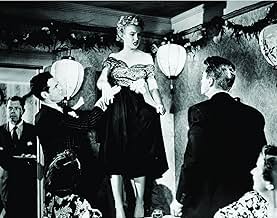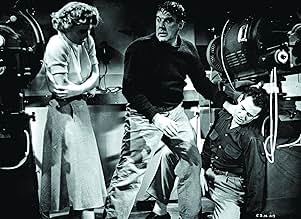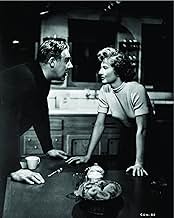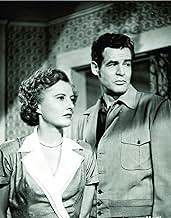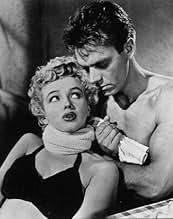IMDb RATING
7.0/10
7.9K
YOUR RATING
Mae Doyle comes back to her hometown a cynical woman. Her brother Joe fears that his love, fish cannery worker Peggy, may wind up like Mae. Mae marries Jerry and has a baby; she is happy but... Read allMae Doyle comes back to her hometown a cynical woman. Her brother Joe fears that his love, fish cannery worker Peggy, may wind up like Mae. Mae marries Jerry and has a baby; she is happy but restless, drawn to Jerry's friend Earl.Mae Doyle comes back to her hometown a cynical woman. Her brother Joe fears that his love, fish cannery worker Peggy, may wind up like Mae. Mae marries Jerry and has a baby; she is happy but restless, drawn to Jerry's friend Earl.
- Awards
- 3 wins total
William Bailey
- Waiter
- (uncredited)
Harry Baum
- Restaurant Patron
- (uncredited)
Dan Bernaducci
- Guest
- (uncredited)
Albert Cavens
- Restaurant Patron
- (uncredited)
Dick Cherney
- Fisherman
- (uncredited)
Charles Cirillo
- Restaurant Patron
- (uncredited)
Irene Crosby
- Guest
- (uncredited)
Russell Custer
- Fisherman
- (uncredited)
Tony Dante
- Fisherman
- (uncredited)
Roy Darmour
- Man
- (uncredited)
- Director
- Writers
- All cast & crew
- Production, box office & more at IMDbPro
Featured reviews
This Fritz Lang film has been largely ignored though in it's way it is as psychologically astute as many of his better known works such as "Scarlett Street". In transposing a Clifford Odets play from New York to a Californian fishing community some of the more florid dialogue seems unnaturally heightened but the performances of the three principals (Barbara Stanwyck, Robert Ryan and particularly Paul Douglas) are stunning and the emotional core of the film is so strong that an audience can feel bruised by what's on screen. The blue collar milieu is perfectly evoked, the black-and-white cinematography by Nicholas Musuraca is first-rate and even the score seems understated, adding to, rather than detracting from the dramatic effect. Essential viewing.
clash by night is a great example of what a difference great acting can make. those were the days! story is full of usual cliches, but stanwyck, paul douglas, robert ryan, and a young marilyn monroe: wow!!! and it shows how sexy a film can be without any "sex scenes" or even a hint of nudity.
CLASH BY NIGHT is a melodrama that betrays its stageplay origins with some artful but sometimes arty dialogue that attempts to get us beneath the skin of its three main characters--and occasionally does. But it's a tribute to the acting skill of Stanwyck, Paul Douglas and Robert Ryan that their characters come alive with all their flaws and longings exposed.
Barbara is excellent as a woman who returns to a fishing village after a long time away, a bitter, defeated woman still trying to find a niche for herself. Paul Douglas does a remarkably fine job as a good-hearted man, simplistic in nature, who latches onto her only to have her betray him with the lusty Robert Ryan. Lookers on include two very interesting performers--Keith Andes and Marilyn Monroe (on her way up). Andes breathes life into the role of Barbara's disgruntled brother and should have been groomed for stardom--he had the looks and appeal of a major star.
A somewhat downbeat ending resolves the conflict--but along the way there are some very high-strung moments from Stanwyck that she plays to perfection. Marilyn Monroe demonstrates talent in a minor role.
A bit talky and stagebound in some scenes--but an interesting melodrama thanks mainly to the gripping performances of Stanwyck, Douglas and Ryan. Ryan would have made a great Stanley Kowalski in 'Streetcar' based on his drunk scene in this one. He can play a brute about as well as anyone and here he's quite an actor, matching Stanwyck's intense performance with a sturdy one of his own.
Barbara is excellent as a woman who returns to a fishing village after a long time away, a bitter, defeated woman still trying to find a niche for herself. Paul Douglas does a remarkably fine job as a good-hearted man, simplistic in nature, who latches onto her only to have her betray him with the lusty Robert Ryan. Lookers on include two very interesting performers--Keith Andes and Marilyn Monroe (on her way up). Andes breathes life into the role of Barbara's disgruntled brother and should have been groomed for stardom--he had the looks and appeal of a major star.
A somewhat downbeat ending resolves the conflict--but along the way there are some very high-strung moments from Stanwyck that she plays to perfection. Marilyn Monroe demonstrates talent in a minor role.
A bit talky and stagebound in some scenes--but an interesting melodrama thanks mainly to the gripping performances of Stanwyck, Douglas and Ryan. Ryan would have made a great Stanley Kowalski in 'Streetcar' based on his drunk scene in this one. He can play a brute about as well as anyone and here he's quite an actor, matching Stanwyck's intense performance with a sturdy one of his own.
A hardened woman returns home to a fishing village only to be caught between two men.
At least the movie has Andes and Monroe whose characters come across as refreshingly natural, along with revealing stock footage of the fishing industry. However, the rest of the film is pitched about ten decibels over the top, with all the subtlety of a hammer blow. Douglas's Jerry is not just a nice guy, he's a rub-your-nose-in-it Nice Guy. Similarly for Ryan's cynical Earl and Stanwyck's hard case Mae. Not even such first-rate performers as these can overcome the relentlessly overblown dialog or stagy sets. Nor does it appear the three were allowed to shade their performances beyond one-dimensional caricature. At the same time, the symbolism of roiling seas and surging tide is about as necessary as gravy on soup. In short, the movie amounts to a textbook exercise of heavy-handed histrionics and too much talk, Fritz Lang or no Fritz Lang.
I expect other reviewers are right about the material being shaped for 1950's audiences. In those days, one way of getting people away from TV was to promise them titillation since there was none on TV. But then producers faced the problem of Production Code limits on what could be shown or said on screen, especially in the way of sex. Thus, the emphasis in the film is on the atmospherics of desire instead of anything more literal. This results in a movie that, unfortunately, drowns in an overlay of heavy breathing, standard innuendo, and redundant symbolism. Such may have titillated audiences then; now there's just a dreary sameness in the repetition. At the same time, that turnaround ending shouldn't be overlooked. Unhappily, it's of the same Code-compromised sort that damaged more 50's movies than just this one.
I guess my biggest regret is how the movie takes three of Hollywood's most capable actors and reduces them to near-caricature of their usual screen persona, Douglas and Ryan, especially. Here's hoping they were at least well paid.
At least the movie has Andes and Monroe whose characters come across as refreshingly natural, along with revealing stock footage of the fishing industry. However, the rest of the film is pitched about ten decibels over the top, with all the subtlety of a hammer blow. Douglas's Jerry is not just a nice guy, he's a rub-your-nose-in-it Nice Guy. Similarly for Ryan's cynical Earl and Stanwyck's hard case Mae. Not even such first-rate performers as these can overcome the relentlessly overblown dialog or stagy sets. Nor does it appear the three were allowed to shade their performances beyond one-dimensional caricature. At the same time, the symbolism of roiling seas and surging tide is about as necessary as gravy on soup. In short, the movie amounts to a textbook exercise of heavy-handed histrionics and too much talk, Fritz Lang or no Fritz Lang.
I expect other reviewers are right about the material being shaped for 1950's audiences. In those days, one way of getting people away from TV was to promise them titillation since there was none on TV. But then producers faced the problem of Production Code limits on what could be shown or said on screen, especially in the way of sex. Thus, the emphasis in the film is on the atmospherics of desire instead of anything more literal. This results in a movie that, unfortunately, drowns in an overlay of heavy breathing, standard innuendo, and redundant symbolism. Such may have titillated audiences then; now there's just a dreary sameness in the repetition. At the same time, that turnaround ending shouldn't be overlooked. Unhappily, it's of the same Code-compromised sort that damaged more 50's movies than just this one.
I guess my biggest regret is how the movie takes three of Hollywood's most capable actors and reduces them to near-caricature of their usual screen persona, Douglas and Ryan, especially. Here's hoping they were at least well paid.
The subheading in the IMDb page for "Clash by Night" calls this film noir. Many fans of the genre may be disappointed. It does have one of the great film noir directors in Fritz Lang and stars two of the genres foremost performers in Barbara Stanwyck(DOUBLE INDEMNITY) and Robert Ryan(The Set Up). However, the style is more romantic drama than film noir. It reminds me of the filmed plays by Elia Kazan like "A Streetcar Named Desire". It even has a character screaming a name out the window. I guess the crime element is missing here but I guess infidelity would fit. The dialogue is up to the standard you'd expect a luminary like Clifford Odets to create. I was unsure if I would agree with the way the film ended but the characterization and plot were so well done, I knew that the ending would not disappoint. I was right.
Did you know
- TriviaThis movie was shot while Barbara Stanwyck was in the process of divorcing Robert Taylor. The movie also features the rising young star Marilyn Monroe. Barbara gives a good performance in one of her most memorable films. Despite her emotional devastation due to the divorce, the crew noted Stanwyck's lack of a diva tantrum. Fritz Lang later said, "She's fantastic, unbelievable, and I liked her tremendously. When Marilyn missed her lines - which she did constantly - Barbara never said a word."
- GoofsWhile at the tavern, Mae and Jerry watch the moon rise over the ocean. The film takes place in Monterey, California, which is on the West coast, where the moon rises over the hills and sets on the ocean.
- Crazy creditsand introducing Keith Andes
- ConnectionsEdited into Les Amoureux du cinéma (1987)
- SoundtracksI Hear a Rhapsody
Written by George Fragos (uncredited), Jack Baker (uncredited) and Dick Gasparre (uncredited)
Sung by Tony Martin
- How long is Clash by Night?Powered by Alexa
Details
Box office
- Gross worldwide
- $62
- Runtime1 hour 45 minutes
- Color
- Aspect ratio
- 1.37 : 1
Contribute to this page
Suggest an edit or add missing content



